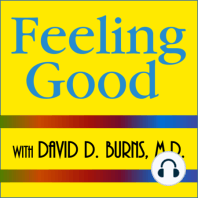50 min listen

184: What Comes First? Negative Thoughts or Feelings? Solving the Chicken vs. the Egg Problem, and More!
184: What Comes First? Negative Thoughts or Feelings? Solving the Chicken vs. the Egg Problem, and More!
ratings:
Length:
40 minutes
Released:
Mar 16, 2020
Format:
Podcast episode
Description
Today, Rhonda and David answer several challenging questions submitted by listeners like you. What schools of therapy are embedded in TEAM? Do negative feelings cause negative thoughts? Or do negative thoughts cause negative feelings? Or both? Or neither? “Can TEAM-CBT help bipolar patients during the depressed phase?” How do you make Externalization of Voices work? I get stuck! For example, my patient said, "It's unfair that I cannot get a job!" Is there a cure for OCD? 1. What schools of therapy are embedded in TEAM? Dear Dr. Burns, I have some questions specifically about T.E.A.M. therapy. You mention in a blog post that T.E.A.M. therapy "integrates features and techniques from more than a dozen schools of therapy." I'm aware of many of the CBT techniques you use, but I don't think I've read yet of any technique belonging to any other schools of therapy. Would you be so kind as to mention such techniques? Madelen Hi Madelen, This is important because I believe we need to get away from competing schools of therapy and need to create a new, data-driven structure for therapy based on research on how therapy works, which is what TEAM is. At the M = Methods part of the session, you can include methods from any school of therapy. Here are some of the schools of therapy that I draw upon TEAM-CBT. Individual / Interpersonal downward arrow: same (psychoanalytic / psychodynamic) Flooding / Experimental technique: behavior therapy (exposure) Externalization of Voices: Gestalt / Psychodrama / Buddhism Acceptance Paradox: Buddhism Self-Defense Paradigm: REBT CBA / Paradoxical CBA / Devil’s Advocate: Motivational techniques Identify the distortions / examine the evidence: cognitive therapy Empathy: Rogerian (humanistic) therapy Five Secrets / Forced Empathy: Interpersonal therapy Shame-Attacking Exercises: Humor-based therapy / Buddhism Be Specific / Let’s Define Terms: Semantic Feared Fantasy: Role-Playing / Psychodrama / Exposure One-Minute Drill / Relationship Probe: Couple’s Therapy Time Projection / Memory Rescripting: Hypnotherapy Anti-Procrastination Sheet: Behavioral activation therapy (Lewinsohn-type therapy) Brief Mood Survey / Evaluation of Therapy Session: data-driven therapy Talk Show Host / Smile and Hello Practice / Flirting Training: Modeling / teaching effective social behavior Storytelling: indirect hypnosis. Positive Reframing: Paradoxical psychotherapy. Hidden emotion technique: psychoanalytic / psychodynamic Do you need more? Can provide if you want. Let me know why you have this particular interest!At any rate, I really enjoyed and appreciate your thoughtful questions, thanks!David 2. Do negative feelings cause negative thoughts? Or do negative thoughts cause negative feelings? Or both? Or neither? Hello Dr Burns, I would like to thank you for your podcasts. I greatly enjoy listening to them and find them very much helpful both in my personal life and my work as a psychologist. I do have a question: you talk about how cognitive distortions cause anxiety and depression. Are cognitive distortions also a result of depression and anxiety? For instance, if a person was to become depressed after experiencing loss, would they then discount the positive in their lives to a larger extent, for example? Thank you very much! Audrey Hi Audrey, Yes, depression creates a negative bias in perceptions, so you pick out information and details that support your distorted thoughts, like "I'm a loser" or "my case is hopeless." My research, which I'll report in my new book, Feeling Great (sept 2020) indicates that negative thoughts trigger feelings of depression and anxiety, which, in turn trigger more negative thoughts. This is a negative vicious cycle. There is also a positive cycle, in that positive thoughts that you believe to be true trigger positive feelings, which, in turn trigger more positive thoughts! Thanks for the question, Audrey. david 3. “Can TEAM-CBT help bipolar patients during the depressed phase?” Name: S
Released:
Mar 16, 2020
Format:
Podcast episode